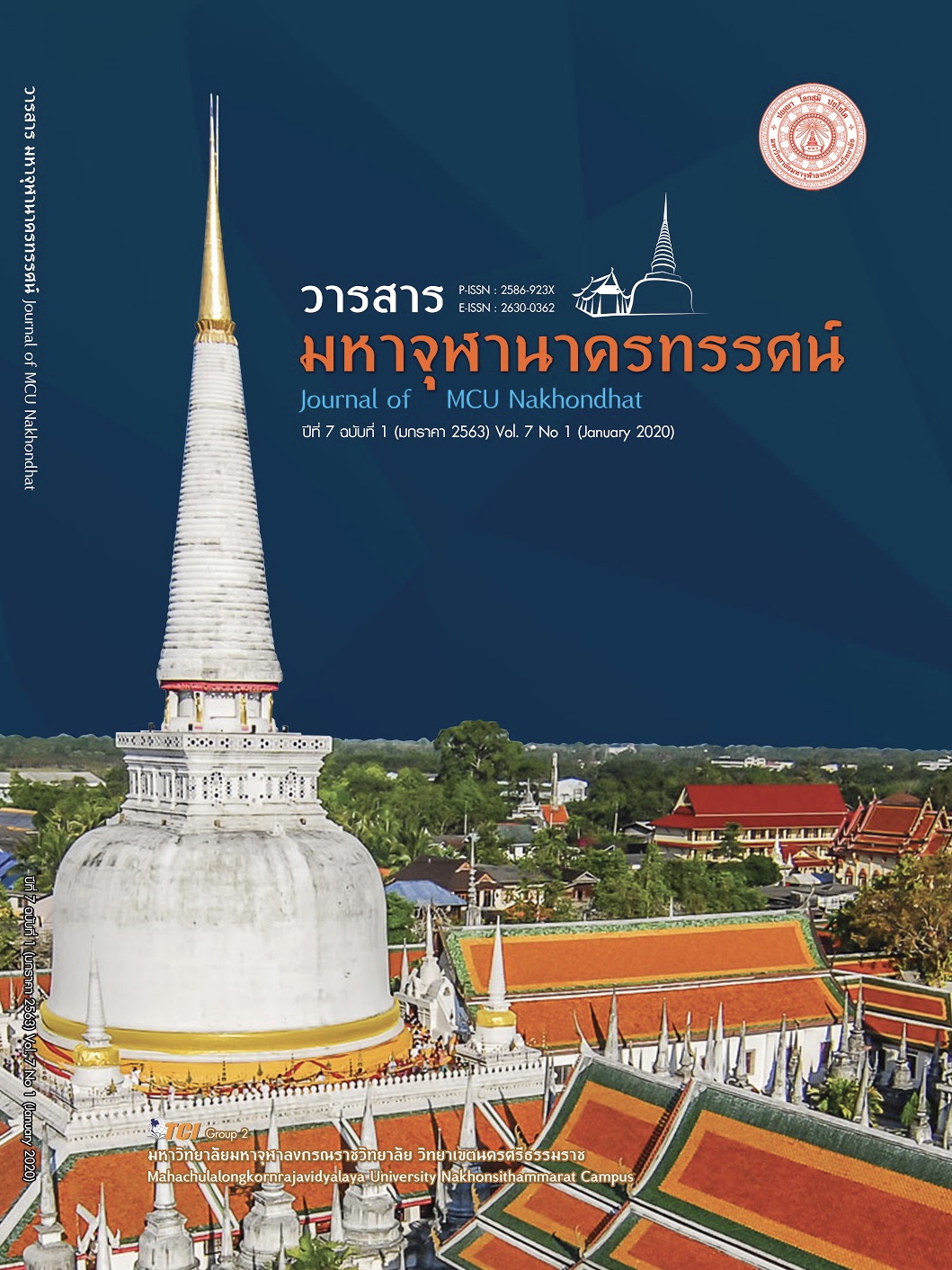THE GOVERNING BY THE BUDDHIST MONASTIC ORDER WITH NEW DIRECTION OF THE GOVERNING
Main Article Content
Abstract
Slideshow modern era of corporate governance principles within the process itself. State support Form of government by Gautama Buddha and the Sangha in later. For the ruling clergy in Thailand has developed to the ruling clergy in the past. The management of priests and religious progress. For a new direction in the administration of Buddhist Thailand in the future. The ecclesiastical guidelines governing structure reform based on the principles of Discipline. And there is decentralization Decentralization Ministry The decentralization reform or any important as the main discipline of the Buddha delivered by reforms in the way of integration to meet the demand. The existence and activity of the clergy. If any reforms can’t be implemented must take the form of the clergy. Mandatory administrative help set the direction for reform is moving in the same direction. And the defense of the principles of the rule will have on the future evolution of society is changing, respectively Puttha permission to modify. But the dominance of the Theravada Sangha decided to maintain compliance with the discipline it brings a good understanding and a direct benefit to the ruling clergy in the present and in the future. Causing a disturbance exemplary rule of the clergy in Thailand, this is the rule of the clergy Thailand
Article Details
References
ปภาวดี ดุลยจินดา. (2545). หลักการทั่วไปเกี่ยวกับการบริหารราชการ. นนทบุรี: สำนักพิมพ์มหาวิทยาลัยสุโขทัยธรรมาธิราช.
ปวีณ ณ นคร. (2545). วิวัฒนาการของการบริหารราชการไทย. นนทบุรี: สำนักพิมพ์มหาวิทยาลัยสุโขทัยธรรมาธิราช.
พระธรรมปิฎก (ป.อ. ปยุตฺโต). (2540). ความสำคัญของพระพุทธศาสนาในฐานะศาสนาประจำชาติ. กรุงเทพมหานคร: มูลนิธิพุทธธรรม.
พระเมธีธรรมาภรณ์ (ประยูร ธมฺมจิตฺโต). (2539). การปกครองคณะสงฆ์ไทย. กรุงเทพมหานคร: มูลนิธิพุทธธรรม.
มัลลิกา มัสอูดี. (2539). ธนบุรีและรัตนโกสินทร์ตอนต้น. นนทบุรี: สำนักพิมพ์มหาวิทยาลัยสุโขทัยธรรมาธิราช.
มัลลิกา มัสอูดี. (2544). ลักษณะการปกครองของไทย. นนทบุรี: สำนักพิมพ์มหาวิทยาลัยสุโขทัยธรรมาธิราช.
ลิขิต ธีรเวคิน. (2546). วิวัฒนาการการเมืองการปกครองของไทย. กรุงเทพมหานคร: สำนักพิมพ์มหาวิทยาลัยธรรมศาสตร์.
วิมล วิโรจพันธุ์ และคณะ. (2548). ประวัติศาสตร์ชาติไทย. กรุงเทพมหานคร: บริษัท อัลฟ่า มิเล็นเนียม จำกัด.
วิไลลักษณ์ เมฆารัตน์. (2549). แคว้นสุโขทัย. นนทบุรี: สำนักพิมพ์มหาวิทยาลัยสุโขทัยธรรมาธิราช.
วิไลเลขา ถาวรธนสาร. (2555). พื้นฐานวัฒนธรรมไทย. กรุงเทพมหานคร: สำนักพิมพ์มหาวิทยาลัยรามคำแหง.
วิวัฒน์ เอี่ยมไพรวัน. (2547). แนวคิดเกี่ยวกับประวัติศาสตร์การเมืองไทย. นนทบุรี: สำนักพิมพ์มหาวิทยาลัยสุโขทัยธรรมาธิราช.
วิเศษฐ์ ทวีเศรษฐ และสุขุม นวลสกุล. (2544). การเมืองและการปกครองไทย. กรุงเทพมหานคร: สำนักพิมพ์มหาวิทยาลัยรามคำแหง.


